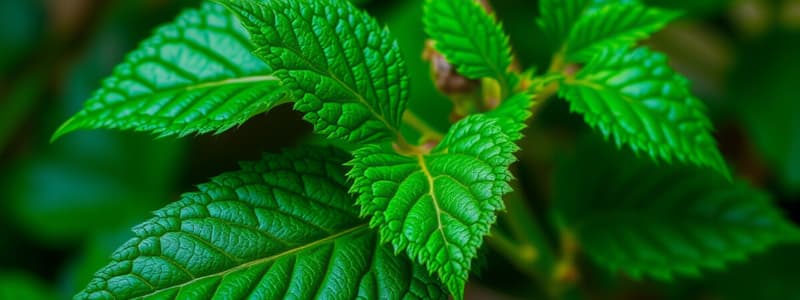Podcast
Questions and Answers
What is hardiness?
What is hardiness?
Hardiness is a personality trait that is associated with a person's ability to manage and respond to stressful life events.
What does Kobasa argue?
What does Kobasa argue?
Kobasa argues that people differ considerably in their ability to cope with stressors. She used the term hardiness to describe aspects of personality that make some individuals resistant to the effects of stress.
What are the three main elements of a hardy personality?
What are the three main elements of a hardy personality?
The 3 C's: Control, Commitment, Challenge.
What is Control (3 C's)?
What is Control (3 C's)?
What is Commitment (3 C's)?
What is Commitment (3 C's)?
What is Challenge (3 C's)?
What is Challenge (3 C's)?
For Kobasa, what does this psychological hardiness act as?
For Kobasa, what does this psychological hardiness act as?
What does having a hardy personality result in?
What does having a hardy personality result in?
What are people who have high scores on hardiness measures less likely to suffer from?
What are people who have high scores on hardiness measures less likely to suffer from?
What are some differences between people high in hardiness and people low in hardiness?
What are some differences between people high in hardiness and people low in hardiness?
What were the Procedures in Kobasa's (1979) study?
What were the Procedures in Kobasa's (1979) study?
What were the Results in Kobasa's (1979) study?
What were the Results in Kobasa's (1979) study?
What were the Conclusions in Kobasa's (1979) study?
What were the Conclusions in Kobasa's (1979) study?
What did Maddi et al. do?
What did Maddi et al. do?
Why may there be some concerns about Maddi's study, such as social desirability?
Why may there be some concerns about Maddi's study, such as social desirability?
Flashcards are hidden until you start studying
Study Notes
Hardiness Overview
- Hardiness is a personality trait that enhances an individual’s ability to manage and respond to stress.
- It serves as a protective buffer against the negative effects of stressors.
Kobasa's Perspective
- Kobasa posits that individuals have varying capacities to cope with stress, introducing the concept of hardiness.
- Hardiness encompasses characteristics that contribute to resilience against stress.
Key Elements of Hardy Personality
- The 3 C's of hardiness are: Control, Commitment, and Challenge.
Control
- Control refers to the perception of having influence over one’s circumstances, rather than being at the mercy of external factors.
Commitment
- Commitment involves a strong dedication to goals or tasks, fostering motivation throughout the process.
Challenge
- Challenge is viewed as an opportunity for personal growth, recognizing that stress is an inevitable part of life.
Effects of Hardiness
- Individuals with high hardiness experience reduced physiological arousal in stressful situations, decreasing the likelihood of stress-related disorders.
- Hardy individuals are less likely to suffer from psychological and physical disorders related to stress due to lower cortisol levels.
Differences Based on Hardiness Levels
- High Hardiness: Analyze stressors for resolutions, seek and provide social support, maintain a healthy lifestyle.
- Low Hardiness: Often avoid stress through distractions, feel victimized by their circumstances, and may neglect health.
Kobasa (1979) Study Methodology
- Study involved 600 executives and managers who completed personality questionnaires and documented illnesses/stressful events from the past three years.
- Participants were divided into two groups based on their illness scores: high stress/high illness and high stress/low illness.
Kobasa (1979) Findings
- Despite both groups reporting high stressful events, the low illness group exhibited traits of hardiness: feeling in control, having a sense of purpose, and viewing change positively.
Kobasa (1979) Conclusions
- Individuals embodying hardiness are better equipped to handle stress and face a lower risk of stress-related illnesses.
Supporting Research
- Maddi et al. studied employees facing workforce reductions, observing that one-third thrived despite stress, largely exhibiting hardiness traits.
Concerns About Measuring Hardiness
- Reliance on self-report measures for assessing hardiness may lead to biases, including social desirability effects.
- Variety in hardiness scales can lead to measurement confusion and reduced clarity in findings.
Studying That Suits You
Use AI to generate personalized quizzes and flashcards to suit your learning preferences.




